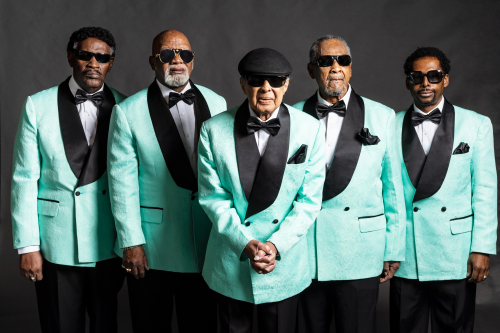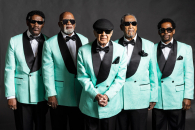Blind Boys of Alabama
Click  on photo to download high resolution version
on photo to download high resolution version
All rights reserved. Photos are for editorial use only.
Photos
Latest ReleaseView All
Echoes of the South
Release date: 9.8.23
Label: Single Lock Records
Press Releases View All
Five-Time Grammy Winners Blind Boys of Alabama Earn Three 2024 Grammy Nominations, Their Most Ever in a Single Year
Read MoreBlind Boys Of Alabama Host A Homecoming For The Ages On First Album In Six Years, ‘Echoes Of The South’, Out Today Via Single Lock Records
Read MoreBlind Boys Of Alabama Reimagine Stevie Wonder’s “Heaven Help Us All” For Closing Track On First Album In Six Years, Echoes Of The South (September 8 / Single Lock Records)
Read MoreBiography View
On June 10, 1944, six teenagers from the Alabama Institute for the Negro Deaf and Blind arrived at the headquarters of Birmingham radio station WSGN. Broadcast from a studio at the Dixie Carlton Hotel, the station was a fixture for news and music in the area, but for the students of the Institute, it was far more than that: it was a beacon of hope, a refuge from the harsh realities of the Jim Crow South, a portal to another world they could only dream of. With no radios available at school, the boys had to get creative in order to listen, often slipping away to the homes of nearby friends and family members in the afternoons to catch vocal groups like the Golden Gate Quartet on their favorite program, “Echoes Of The South.” On this particular afternoon, however, the boys would be doing the singing themselves, performing professionally for the very first time as The Happy Land Jubilee Singers. They had no way of knowing, of course, but the sextet—who would later change their name to the Blind Boys of Alabama—was embarking on an 80-year odyssey that day, one that would take them everywhere from Carnegie Hall and the White House to the Grammys and the Gospel Hall of Fame as they broke down racial barriers, soundtracked the Civil Rights movement, and helped redefine modern gospel music in the process.
“From the very first show, the Blind Boys of Alabama have always tried to lift people up and make them feel good,” says 91-year-old Jimmy Carter. “We don’t want people to come to our concerts and leave the same way they came. We want to give them a better outlook on life.”
With their righteous new album, Echoes Of The South, the Blind Boys do precisely that, pairing some of the traditional spirituals and long-lost gospel classics that first inspired them to sing together with timeless soul and R&B tunes made famous by the likes of Stevie Wonder, Curtis Mayfield, and Pops Staples. Recorded and mixed by Matt Ross-Spang (Jason Isbell, Old Crow Medicine Show) and Ben Tanner (Alabama Shakes, John Paul White), the collection is as moving as it is enduring, transcending genre and era to touch something deep and fundamental about the human condition. These are songs of love and friendship, joy and gratitude, faith and perseverance. Uplifting as they are, the recordings can feel bittersweet at times, too: Carter retired from performing following the sessions, while two longtime members, Paul Beasley and Benjamin Moore, Jr., have since passed away. Despite the losses, the Blind Boys of Alabama show no signs of slowing down.
“The spirit of the Blind Boys isn’t about what you can’t do; it’s about what you can do,” says Ricky McKinnie, who joined the group in 1989. “As long as we stay true to that, as long as everybody gives all that they have to give and we sing songs that touch the heart, this group will live on forever.”
Hailed as "gospel titans" by Rolling Stone, the Blind Boys of Alabama defied the considerable odds stacked against them in the segregated south, working their way up from singing for pocket change to performing for three different American presidents. Inducted into the Gospel Music Hall of Fame in 2003, the group has won five Grammy Awards for their albums (plus a Grammy Lifetime Achievement Award), received a National Heritage Fellowship from the National Endowment for the Arts, and collaborated with artists as diverse as Mavis Staples, Stevie Wonder, Chrissie Hynde, Lou Reed, Tom Waits, Peter Gabriel, Bonnie Raitt, and Bon Iver. Beyond the group’s considerable commercial success, the artistic influence the Blind Boys imparted onto their contemporaries and the generations of gospel, rock, and soul singers who followed is immeasurable. The New York Times explained that in their earlier years, the band "came to epitomize what is known as jubilee singing, a livelier breed of gospel music," adding that "they made it zestier still by adding jazz and blues idioms and turning up the volume, creating a sound…like the rock 'n' roll that grew out of it." TIME raved that the group has always been “hunting for—and finding—the perfect note or harmony that lifts an old tune into the sublime," while The Washington Post praised their "soul-stirring harmonies" and "cross-genre collaborations," and The New Yorker simply dubbed them "legendary."
For Echoes Of The South, the Blind Boys went back to their roots for inspiration, both in terms of song selection and recording techniques. Working out of The Nutthouse in Sheffield, AL, the singers performed live on the floor with a stripped-down band like the old days, teaming up with an all-star crew of players including pianist Phil Cook (Bon Iver, Hiss Golden Messenger), drummer Chad Gamble (Jason Isbell, Beck), and bassist Dennis Crouch (Gregg Allman, Emmylou Harris) to capture a series of electrifying performances that channeled the raw energy, lush harmonies, and spiritual rapture the group was raised on.
“We really wanted to get back to the heart of the Blind Boys,” says Ross-Spang, who produced the album along with Tanner and the group’s co-manager, Charles Driebe. “While the songs span decades, the feeling from them should always be timeless, and we tried to capture that magic live in the room.”
There is indeed an undeniable magic to Echoes Of The South, which opens with the stirring “Send It On Down.” A standard from the band’s early days, the tune builds to a call-and-response fever pitch around a single, ecstatic vamp designed to bring the entire congregation to its feet. “Well here we are / Blind Boys of Alabama,” Carter announces at the top. “You know we’ve been around a long time / But the good news is we’re still here.” Like so much of the album to come, it’s a song of worship, appreciation, and devotion, one that surrenders itself body and soul to the power of the Holy Spirit. The blissful “Jesus You’ve Been Good To Me” gives thanks to the Lord for guiding and watching over us, while the euphoric “Nothing But Love” revels in the open-hearted power of prayer, and the doo-wop-tinged “Work Until My Days Are Done” pledges to carry on with God’s mission through good times and bad.
While no one knew these would be the group’s final recordings with Beasley and Moore, there’s an eerie prescience to the song choices that comes with the clarity of hindsight. “This may be the last time we ever sing together / It may be the last time, I don’t know,” the Boys ruminate on “The Last Time,” a mournful blues about loss and mortality. The poignant “Friendship,” meanwhile, finds Beasley and Moore sharing lead vocal duties as they promise to carry a companion who can’t go on, and the tender “Wide River To Cross” senses “a sorrow in the wind,” acknowledging that “sometimes even the strongest soldier falls.”
“We lost two great champions in Ben and Paul,” Carter reflects. “But I know they would want the Blind Boys to keep on going.”
And in the end, that spirit of resilience is what Echoes Of The South is all about. The album isn’t just a reminder of how far the group has come, but rather a declaration of how far they still have to go. “I’ve got to keep on pushing / Can’t stop now / Move up a little higher / Someway, somehow,” they sing on the spare “Keep On Pushing.” The work those six young men started back in Birmingham still isn’t finished, so the Blind Boys of Alabama keep on singing, spreading light and love everywhere they go.


_500_333_s.jpeg)

_195_130_s.jpeg)
_400_400_s_c1.jpg)